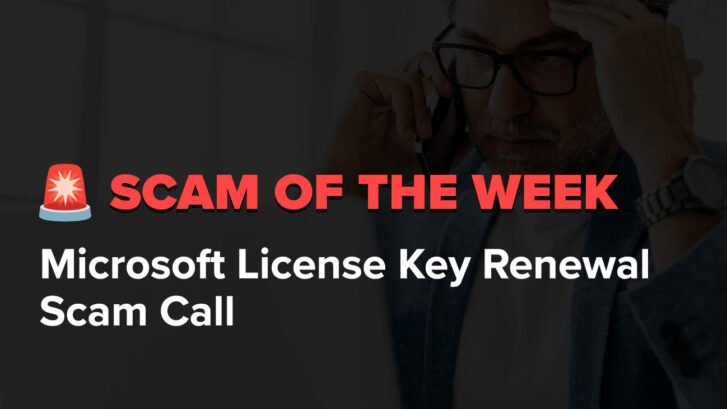Imagine receiving an urgent call claiming your Microsoft Support and Windows license key is about to expire. Panic sets in as you worry about losing critical services and support. This is exactly the reaction scammers aim for with the Microsoft License Key Renewal Scam Call. In this week’s spotlight, we delve into the details of this cunning scam that exploits the trusted Microsoft brand, creating a false sense of urgency to compromise your data and financial security.
In this article, we cover:
- The details of the Microsoft License Key Renewal Scam Call
- Why the Microsoft License Key Renewal Scam Call is dangerous
- How to protect yourself from the Microsoft License Key Renewal Scam Call
The details of the Microsoft License Key Renewal Scam Call
The Microsoft License Key Renewal Scam Call is a deceptive tactic that misuses the Microsoft name to manipulate users into believing they need to renew their Microsoft Support and Windows license key. Scammers create a sense of urgency, urging immediate action by threatening the loss of service if the renewal isn’t completed, putting both your data and financial security at significant risk. The automated message typically informs recipients about the “Subscription of Microsoft Support and Windows license key renewal,” prompting them to press one to cancel or two to continue the service.
The Microsoft License Scam call was first detected in April of 2019, this scam has been prevalent in locations such as California, Texas, New York, South Carolina, and Florida, with a fraud score of 70%.
Actual audio of the Microsoft License Key Renewal Scam Call
“Subscription of Microsoft Support and Windows license key renewal. If you want to cancel this subscription please press one, to continue the service press two.”
Why the Microsoft License Key Renewal Scam Call is dangerous
The Microsoft License Key Renewal Scam Call is particularly dangerous because it exploits the well-known and trusted Microsoft brand, making the scam more believable. By creating a sense of urgency, scammers pressure victims into making hasty decisions, often leading to the disclosure of sensitive personal and financial information. Once scammers gain access to this information, they can commit identity theft, financial fraud, and other malicious activities that can have long-lasting repercussions for the victim.
How the scammers got your number
Scammers usually get your information from data brokers who sell it for various reasons. The sad truth is, anyone can buy your data, and potentially use it not only to call or text you, but also to steal your identity. It’s really important to have your data available in as few places as possible.
The good news is it is possible to find out where your phone number, address, or other personal info is exposed – in seconds. This way you can remove your personal information from data broker sites, reducing the likelihood of you falling victim to fraud, so you can take control of your privacy.
See where your phone number, address, or other info is exposed – in seconds.
🔒 Your info will remain private and secure.
How to protect yourself from the Microsoft License Key Renewal Scam Call
To protect yourself from the Microsoft License Key Renewal Scam Call, always be skeptical of unsolicited calls that request personal information or immediate action. Do not press any numbers if prompted by an automated message; instead, hang up and verify the call’s legitimacy by contacting Microsoft directly through official channels. You can also do a reverse phone number to search to see if there is anything reported on the number they are using.
Use caller ID and call-blocking services to screen unknown numbers. Additionally, consider using services like YouMail, which provide advanced protection against scam calls by identifying and blocking suspicious numbers.
To protect yourself from the Microsoft License Key Renewal Scam Call, download YouMail today.
Find out more about Fraudulent Scams Exploiting Popular Brands at the YouMail Robocall Scam Guide.





